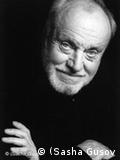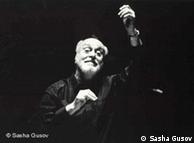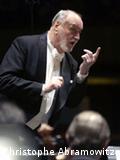Artist Conversation: Sir Colin Davis and Nikolaj Znaider http://www.youtube.com/watch?v=C8fTjfjO27A
Obituary: Colin Davis
 His performances divided both audiences and critics
His performances divided both audiences and critics
By the time he died Sir Colin Davis was the grand old man of British classical music.
At different times he was music director or chief conductor
at three of Britain's leading music institutions: the London Symphony
Orchestra, the Royal Opera House, Covent Garden and the BBC Symphony
Orchestra. And in the 1960s he'd been an orchestral prodigy.But his career got off to a shaky start, and his stint at Covent Garden was marked by a series of productions which provoked boos and harsh reviews, as well as plaudits.
Colin Davis was born in 1927 at Weybridge in Surrey, the fifth of seven children. His father was a bank clerk and the family were not well off.
They did not own a piano, but his father had a gramophone and a collection of classical music records to which the young Davis would listen avidly.
At 11, thanks to the generosity of a relative, he was sent to Christ's Hospital school, where he learned to play the clarinet, and it was there, after hearing a recording of a Beethoven symphony, that he decided he wanted to become a conductor.
"It was a revelation," he later recalled. "I had never heard so much energy concentrated into half an hour. I wanted to be a musician and I wanted to be a conductor. It was the most irrational decision that I have ever made."
He won a scholarship to the Royal College of Music, but because he couldn't play the piano he was not allowed to join the conducting class. Instead he trained as a clarinettist and spent 10 years as a clarinet player (part of that time in the band of the Household Cavalry) and as a struggling freelance conductor.
Abrasive In 1957 he was appointed to his first full-time job, as assistant conductor of the BBC Scottish Orchestra (now the BBC Scottish Symphony Orchestra).
Colin Davis got his big break in 1959 when Otto Klemperer fell ill and he took his place at the Royal Festival Hall to conduct a concert performance of Mozart's Don Giovanni, with Elisabeth Schwarzkopf and Joan Sutherland. The critics were impressed.
 "I was a raw young man"
"I was a raw young man"
He first performed with the London Symphony Orchestra in 1959 in a programme that included a tuba concerto by Vaughan Williams which he never subsequently conducted.
But he wasn't popular with all musicians, acquiring a reputation for tantrums and abrasiveness. In later life he put his behaviour down to arrogance and inexperience.
"I was a raw young man," he said in 2007, of his first encounters with the LSO, "and they were a pretty ferocious bunch of pirates. There were no women in the orchestra, except for a harpist who smoked a pipe. And we had lots of battles." Musical standards were high, but not as high as today and players often arrived at concerts drunk, he claimed.
Personal crisis "The friction was that I was a young man and they were older, and I didn't know much about their profession. And I think they were rather resentful. If you're overly enthusiastic about music, or if you were then, they were very cynical about it, and I don't think I handled it very well. But I survived."
In 1961 he became music director at Sadlers Wells Opera (later to become English National Opera) and in 1967 he was made chief conductor of the BBC Symphony Orchestra.
Professional success had gone hand in hand with a personal crisis in the early 1960s. His first marriage, to the soprano April Cantelo, which had produced two children, collapsed when he fell in love with the family's Iranian au pair, Ashraf Naini, known as Shamsi.
The couple had to marry three times to satisfy both British and Iranian authorities, once in Teheran and twice in the UK, and had five children. Lady Davis died in 2010. Sir Colin's second marriage appeared to mellow him.
 Davis (l) with the composer Michael Tippett in 1964
Davis (l) with the composer Michael Tippett in 1964
But his Wagner Ring cycle, in a highly controversial production by Gotz Friedrich, drew mixed reviews. And many critics disliked his performances of operas by Puccini and Verdi. Even so, in 1977 he became the first British conductor to appear at Wagner's own opera house, Bayreuth, conducting Tannhauser.
He didn't much care for many of the modern opera productions he was asked to conduct. On occasion, he told one interviewer, there were "the most awful scenes" when he objected to a director's approach. But often it was difficult for conductors to object:
"You're going to work with someone, you've seen a design, which can be quite different when it occupies the stage. By then you're committed; you can't just clear off and leave the others to get on with it by themselves. It's not professional. You've got a responsibility towards the orchestra and singers, and you've got to go down with the ship."
Grandeur and passion After leaving Covent Garden he turned down offers from leading US orchestras and went instead to Germany where he spent 10 years at the Bavarian Radio Symphony Orchestra before returning to become the LSO's principal conductor. He was made a CBE in 1965, was knighted in 1980 and became a Companion of Honour in 2001.
In the opera house, on the concert platform and on record he was especially admired for his performances of Mozart, Sibelius, Tippett, Elgar and Britten.
 Meeting the Queen in 2009
Meeting the Queen in 2009
Nor did he have much time for the early music movement, with its attempts to recreate what composers would originally have heard, with period instruments and small ensembles.
"If you try to tell me that Bach's B Minor Mass sounds good with a chorus of single voices, I don't believe it," he once said. "We're interested in the sound composers heard in their minds, and not what they actually heard."
In later life he was quietly-spoken, seemed to lack self-confidence away from the conductor's podium and claimed to dislike "all that charisma stuff", exuding instead a certain inner calm.
In a BBC interview in 2007 he reflected: "You can find in music something you can't find in anything else, because it makes time meaningful - at least it does to me. Every time you give a concert, time is suspended: you're mastering it; time is not the enemy. It doesn't put off death, unfortunately, but it gives you a very good time while you're still alive."
Related Stories
-----
Music is indeed Masur's life. As he told the Orange County Register in 1999, "I was asked once, 'Mr. Masur, what do you plan to do if you retire?' I told them, 'Look, conductors don't retire. They die."'
http://www.answers.com/topic/kurt-masur
贝多芬音乐 | 2008.09.04
独一无二而又卓尔不群:指挥家库尔特•马索尔
他是我们这个时代最重要的指挥家之一,就是在和音乐不那么相关的领域,他也受人尊敬 — 甚至有人希望他出任德国联邦总统。库尔特•马索尔的音乐会从来都是超级别的享受。在今年波恩的贝多芬音乐节上,马索尔指挥的法国国家乐团将会演奏贝多芬的 所有交响曲,而他本人也将在波恩获颁威廉•福特瓦格勒奖(Wilhelm-Furtwängler-Preis)。德国之声记者Klaus Gehrke向读者介绍这位伟大的指挥家。
全神贯注、表情严肃但又和乐手们保持频繁的目光交流:这就是站在指挥台上的库 尔特·马索尔(Kurt Masur)。他的每个动作都体现着音乐的紧张、热烈和绝对的激情。40年来,马索尔一直跻身于世界最著名的指挥家之列。有幸聆听过他指挥的贝多芬交响曲 的人恐怕很难想象,这位音乐大师已经81岁高龄。1927年,马索尔出生在西里西亚的布里格,年轻时在莱比锡学习音乐和指挥,但是提前退学。之后,他在前 东德的哈雷、爱尔福特、什未林以及东柏林喜剧剧团担任助理指挥和指挥。1967年,时年40的马索尔担任了德累斯顿爱乐乐团的指挥,三年之后,他再次回到 莱比锡并且从此将这这里作为自己主要的演出城市。
 Bildunterschrift: Großansicht des Bildes mit der Bildunterschrift:
Bildunterschrift: Großansicht des Bildes mit der Bildunterschrift:
1970年之后,担任莱比锡音乐厅乐队队长的库尔特·马索尔取得了一系列国际演出的 成功,迅速成为前民主德国最有声望的指挥家。到1997年为止,他带领莱比锡音乐厅乐团在多次巡回演出中共举行了超过900场音乐会。当1989年莱比锡 爆发一月游行时,这位深受爱戴的音乐家也投身政治。当时,和这座城市的其他一些名人一道,他对前东德的权力机关说:
"我们共同的担忧和责任让我们今天走到了一起。我们与我们的城市的发展息息相关,因此我们寻找一个解决方案。我们希望您们仔细考虑,这样才能让和平的对话成为可能。"
 Bildunterschrift: Großansicht des Bildes mit der Bildunterschrift:
Bildunterschrift: Großansicht des Bildes mit der Bildunterschrift:
1991年,马索尔成为纽约爱乐乐团的指挥,并且担任这个职位直到2002年。在这段时间里,他创造了一种独特的演出模式。这一模式不仅仅在纽约,而且在整个美国获得了非常好的反响。而创造这一模式的灵感来自于他在被称为"大苹果"的纽约城中的一次散步。
"当时我发现,其实纽约到处都是这样孤单的人。于是我决定要让所有来到我的音乐会的听众都能找到一个理由,让他可以对自己说:这里就是我的家。"
现在,马索尔的工作地点从哈德孙河搬到了塞纳河畔,担任法国国家乐团的指挥。时不时地,他也会想回归到自己的私人生活当中去。但是,现在他的日程还是安排得相当紧凑 - 而马索尔本人也并不觉得这是件多么坏的事:
"我所希望的是逐步减少自己的工作量。如果我早晨突然停止所有的工作,那么您很快就会看到我的讣告。音乐是我生命一部分,音乐让我的生命永恒。我并不是为了成功才从事这一行的。"

沒有留言:
張貼留言
注意:只有此網誌的成員可以留言。